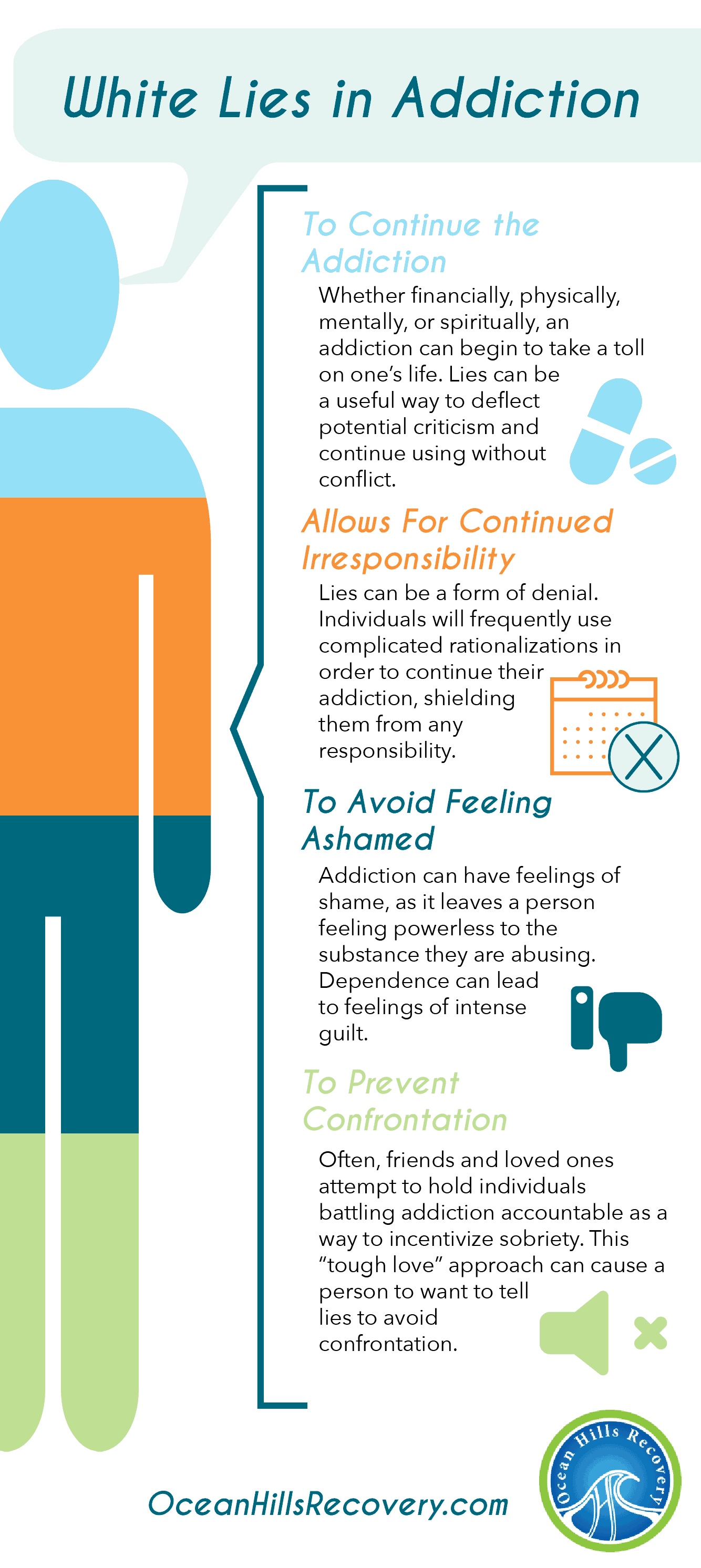Trust is at the foundation of every relationship, something which is essential to maintaining connections with those closest to us. Unfortunately, as someone’s addiction progresses, it can begin to fracture and strain these necessary bonds. The desire for these connections will lead individuals to start telling “white lies” to cover up their use and associated behaviors. People trying to save face may resort to telling lies in addiction. They may also do so to avoid shame and criticism for their situation. However, they can still have a negative impact once friends and loved ones realize they are told untruths. Here are some of the reasons addicted individuals tell white lies in addiction.
To Avoid Feeling Ashamed
Addiction can be marked with feelings of shame, as it leaves a person feeling powerless to whatever substance they are abusing. Dependence, whether it is to drugs, alcohol, or other unwanted types of behavior, can lead to feelings of intense guilt. This guilt will build and eventually make the idea of telling a lie more appealing than admitting the truth. When individuals continue to use despite their desire to abstain from a given activity, it can become especially shame-inducing to admit use has occurred[1].
To Prevent Confrontation
Often, friends and loved ones attempt to hold individuals battling addiction accountable as a way to incentivize sobriety. This “tough love” approach can cause a person to want to avoid confrontation. They will begin to tell lies in addiction to shield themselves from the repercussions of their actions. Instead of facing up to the reality of their behavior, addicted individuals often opt to tell falsehoods that allow them to continue their addiction without negative consequences from those around them.
To Continue the Addiction
One of the biggest reasons people will begin to tell lies in addiction is to hide their dependent behavior. Over time, individuals are often confronted with the reality that their addiction has started to hurt their life. Whether financially, physically, mentally, or spiritually, an addiction can begin to take a toll on one’s life. When they see what their addiction has cost them, it can make it difficult to continue down the same road without seeking some form of intervention. This is when a lie can become a convenient tool to perpetuate an addictive behavior, as it can allow a person to avoid facing up to the reality of their situation. It can also play out in one’s relationships. Lies can be a useful way to deflect potential criticism and continue using without conflict.
Allows For Continued Irresponsibility
When a person tells white lies in addiction, they may do this to further the idea that they are in control and that their behavior is not an issue. Lies can be a form of denial, pushing away the concept that they might have an addiction in the first place. Recognition that a problem exists is the first step towards changing behavior. But telling a lie is an easy way of denying such a problem. Individuals will frequently use complicated rationalizations to continue their addiction[2], shielding them from any responsibility to shift their behavior. Denial offers a certain level of comfort for individuals looking to avoid the painful process of adequately addressing their condition.
Continued after infographic:
Understanding Lies in Addiction and How to Address Them
It can be frustrating to continually hear lies from someone struggling with addiction, as it can become a tired refrain for those who are on the receiving end of them. But it’s important to understand why individuals feel the need to tell lies. They can serve a psychological purpose for the afflicted individual. If you find yourself hearing consistent untruths from someone struggling with an addiction, find a compassionate way to hold them accountable. Avoid using shame and guilt, instead opting for providing a supportive environment for them to be honest with you.
If you or someone you love is struggling with addiction and has started telling white lies to cover up the reality of the situation, contact Ocean Hills Recovery today. We offer a solution-focused approach that is structured according to each individual’s situation. It doesn’t matter how many times you’ve experienced a relapse or what the severity of your condition is. Our trusted team can provide the answers you’re looking for.
Avoid telling lies which perpetuate your addiction and allow the truth to unburden you from your condition. Let the caring clinicians of Ocean Hills Recovery help you jumpstart the recovery process and keep you on the road to sobriety.
Sources:
[1] https://www.verywellmind.com/my-addicted-loved-one-lies-all-the-time-22118
[2] https://blogs.psychcentral.com/addiction-recovery/2014/03/7-honest-reasons-why-addicts-lie/














